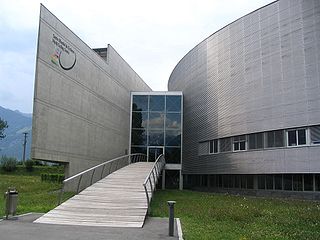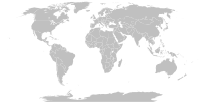
Track cycling is a bicycle racing sport usually held on specially built banked tracks or velodromes using purpose-designed track bicycles.

The Union Cycliste Internationale is the world governing body for sports cycling and oversees international competitive cycling events. The UCI is based in Aigle, Switzerland.

Manchester Velodrome is an indoor Olympic-standard cycle-racing track in Manchester, England, which opened in 1994. Part of the National Cycling Centre, the facility has been home to British Cycling since 1994, coinciding with the nations rise to track cycling dominance at World and Olympic level. The velodrome was also home to UCI ProTeam Ineos Grenadiers, formerly known as Team Sky between 2010 and 2019, a period when the team won 6 Tour de France, 2 Vuelta a Espana and 1 Giro d'Italia with Great Britain riders.

Mountain bike racing is the competitive cycle sport discipline of mountain biking held on off-road terrain. The Union Cycliste Internationale (UCI) recognised the discipline relatively late in 1990, when it sanctioned the world championships in Durango, Colorado. The first UCI Mountain Bike World Cup series took place in 1988. Its nine-race circuit covered two continents—Europe and North America—and was sponsored by Grundig. Cross-country racing was the only World Cup sport at this time. In 1993, a six-event downhill World Cup was introduced. In 1996, cross-country mountain biking events were added to the Olympic Games. In 2006, cross-country mountain biking events became part of the World Deaf Cycling Championships for the first time in San Francisco, USA.
The UCI Track Cycling World Championships are the set of world championship events for the various disciplines and distances in track cycling. They are regulated by the Union Cycliste Internationale. Before 1900, they were administered by the UCI's predecessor, the International Cycling Association (ICA).

Edward Franklin Clancy is a British former professional track and road bicycle racer, who competed between 2004 and 2021.
The 2008–2009 UCI Track Cycling World Cup Classics was a multi race competition over a season of track cycling. The season ran from 31 October 2008 to 18 February 2009. The World Cup is organised by the Union Cycliste Internationale.

Leire Olaberria Dorronsoro ; born 17 February 1977) is a Spanish racing cyclist from the Basque Country. She won the Bronze medal in the Women's points race at the 2008 Summer Olympics, finishing behind Marianne Vos (Netherlands) and Yoanka González (Cuba).
The 2008 UCI Track Cycling World Championships – Women's scratch was the women's scratch race at 2008 UCI Track Cycling World Championships. It was one of the eight women's events, held at the Manchester Velodrome in Manchester, Great Britain on the fifth and final day of the Championships on 30 March 2008. It was the seventh women's scatch race appearance at the UCI Track Cycling World Championships. 21 women from 21 countries participated in the race.
Revolution is a series of track cycling events primarily held at the Manchester Velodrome in the north west of England. It was solely held in Manchester between 2003 and 2012. From Season 10 (2012–2013) meetings have been held additionally at the new UK velodromes; in the Sir Chris Hoy Velodrome, Glasgow, the Olympic Velodrome, London from Season 11 (2013–2014) and the Derby Arena from 2015 to 2016.
The 2010–2011 UCI Track Cycling World Cup Classics was a multi race tournament over a season of track cycling. The season ran from 2 December 2010 to 20 February 2011. The World Cup is organised by the Union Cycliste Internationale.
The 2011–12 UCI Track Cycling World Cup was a multi-race tournament over a season of track cycling. The season ran from 4 November 2011 to 19 February 2012. The World Cup is organised by the Union Cycliste Internationale. In this edition the World Cup consisted of four rounds in Astana, Cali, Beijing and London.
The 2012–2013 UCI Track Cycling World Cup is a multi race tournament over a track cycling. It was the twenty-first series of the UCI Track Cycling World Cup organised by the Union Cycliste Internationale. The series ran from 11 October 2012 to 19 January 2013 and consisted of three rounds in Cali, Glasgow and Aguascalientes.

The 2013–2014 UCI Track Cycling World Cup was a multi race tournament over a track cycling season. It was the twenty-second series of the UCI Track Cycling World Cup organised by the Union Cycliste Internationale. The series ran from 1 November 2013 to 19 January 2014 and consisted of three rounds in Manchester, Aguascalientes and Guadalajara.

The 2014–2015 UCI Track Cycling World Cup was a multi-race tournament over a track cycling season. It was the 23rd series of the UCI Track Cycling World Cup organised by the Union Cycliste Internationale. The series ran from 8 November 2014 to 18 January 2015 and consisted of three rounds in Guadalajara, London, and Cali.
The 2015–16 UCI Track Cycling World Cup was a multi-race tournament over a track cycling season. It was the 24th series of the UCI Track Cycling World Cup organised by the UCI. The series ran from 30 October 2015 to 17 January 2016 and consisted of three rounds in Cali, Cambridge and Hong Kong.
The 2016–17 UCI Track Cycling World Cup was a multi-race series over a track cycling season. It was the 25th edition of the UCI Track Cycling World Cup organised by the UCI. The series ran from 4 November 2016 to 26 February 2017 and consisted of four rounds.
The 2017–18 UCI Track Cycling World Cup was a multi-race tournament over a track cycling season. It was the 26th series of the UCI Track Cycling World Cup organised by the UCI. The series was run from 3 November 2017 to 21 January 2018 and consisted of five rounds.
The 2018–19 UCI Track Cycling World Cup was a multi-race tournament over a track cycling season. It was the 27th series of the UCI Track Cycling World Cup organised by the UCI.
The 2018–19 Six Day Series (also known as the Six Day Cycling Series is a multi six-day track cycling race tournament over a season. It is the 3rd series organised by the Madison Sports Group. This season consists of 7 events across 5 countries.









